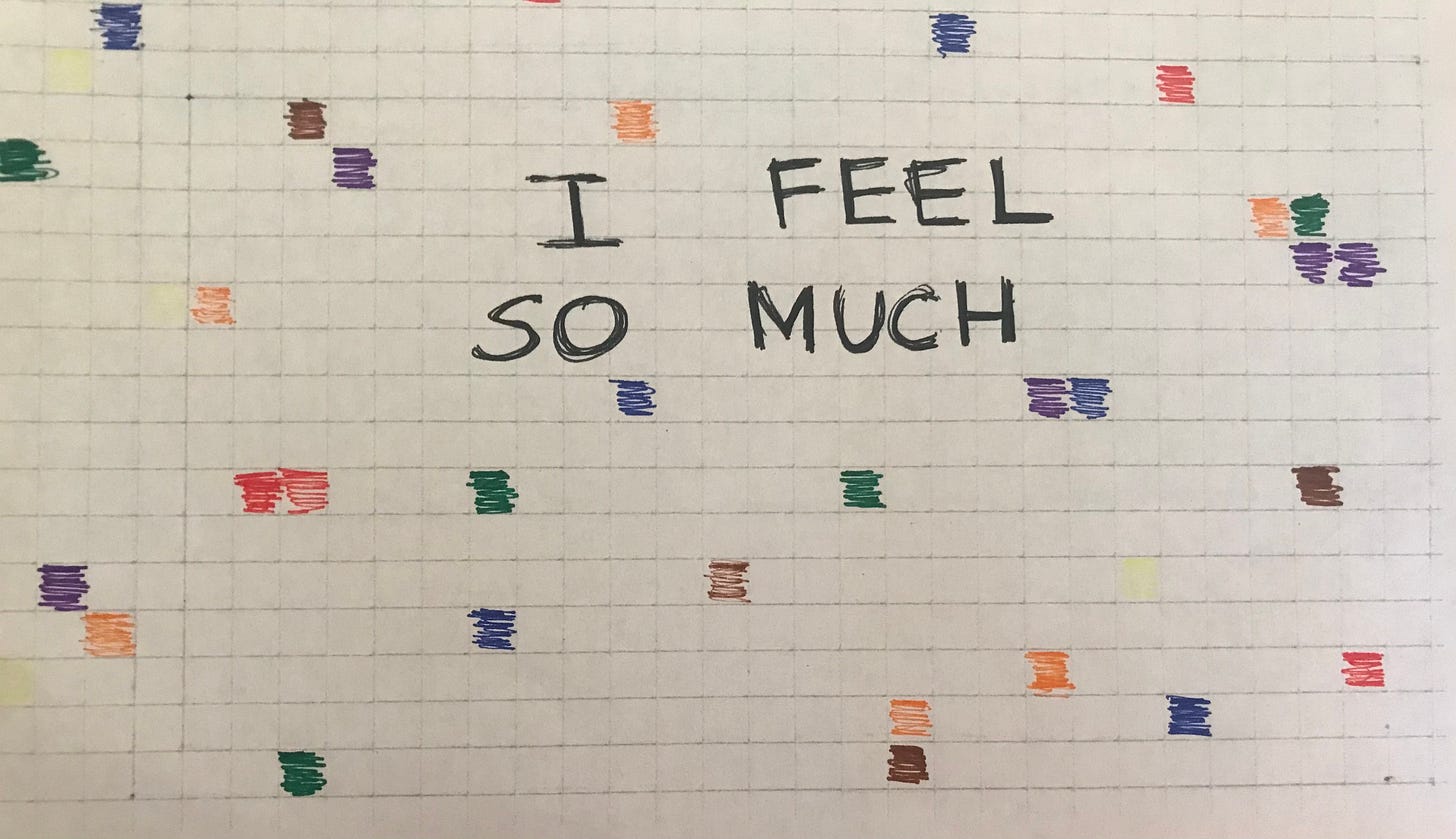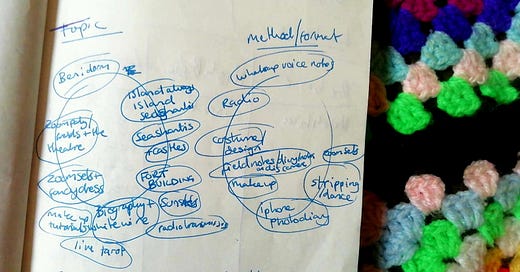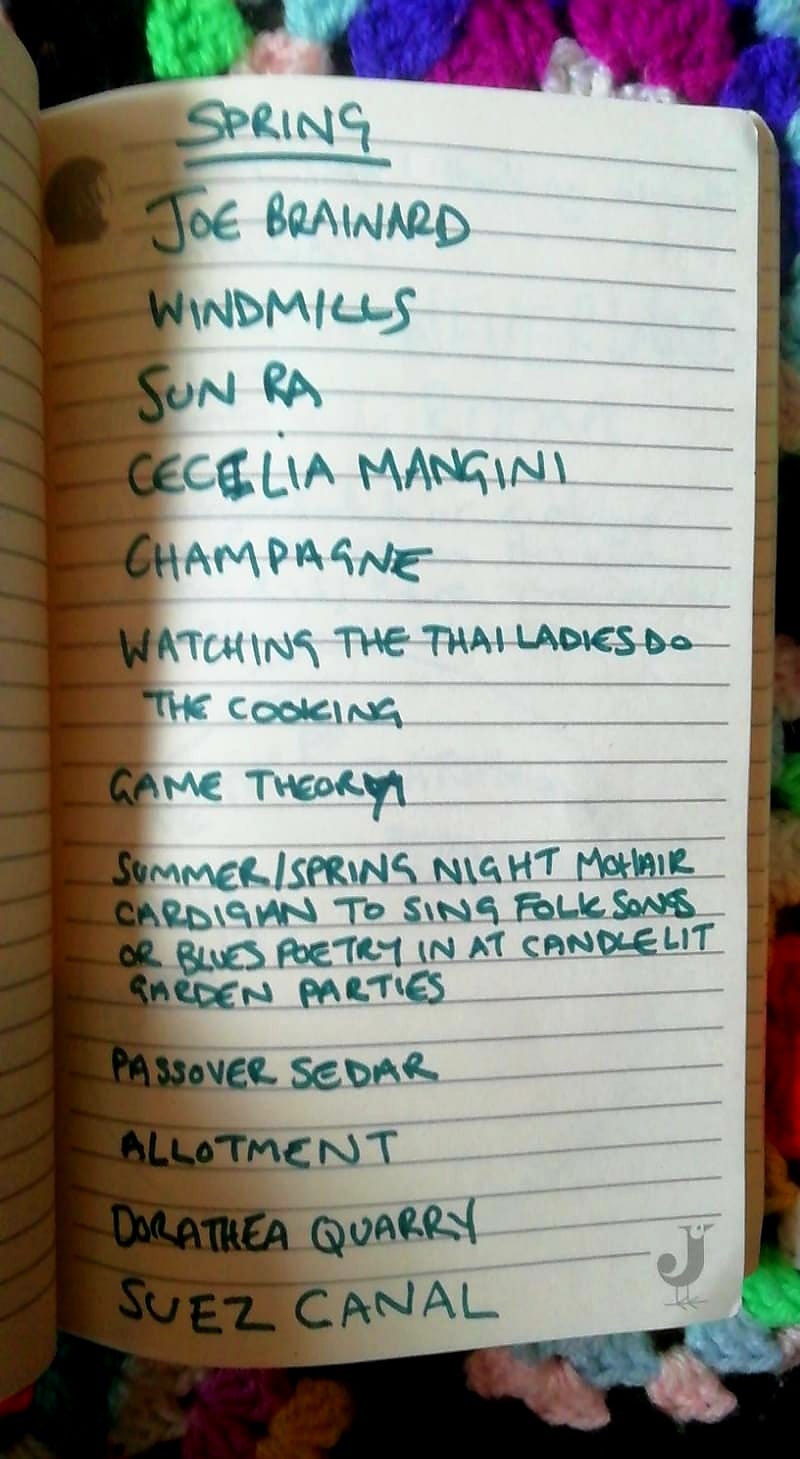Where Is My Mind? Self-Diagnosis & Neurodiversity
Testimonies by self and semi-diagnosed neurodiverse people working in the creative industries.
Neurodiversity is sexy right now. It’s all over the internet. It’s one thing to identify with some memes and it’s another to go through the painstaking and arduous process of self-diagnosis. As an adult, it is unlikely that you will suddenly appear in a doctor’s office being peered at from behind a clipboard, because you had a vague hunch you might be neurodiverse. You cannot be referred by your boss or your social group, or your children... so it will be you and only you, that undertakes the laborious work, reading the books; scanning reams of diagnostic criteria; watching YouTube videos; pacing up and down wrestling with the: “am I, aren’t I?”
Maybe childhood experiences you’d decided to bury have resurfaced, or you reach an age where your coping mechanisms stop working, or you cannot find the root to your persistent anxiety and mental health problems. Of course, some people, depending on their circumstances, might have worked out a series of complex strategies to deal with their difficulties. Case closed? Alas! If only it were that simple. Despite this, we cannot deny that we live in a world geared toward neurotypical thinking.
Why Self Diagnosis?
There are arguments about whether self-diagnosis is “valid”. As Youtuber, Aspergers From The Inside points out, to answer that question we need to understand what is meant by ‘valid’.
Who is validating the diagnosis? Most people would answer, the specialist, of course. So why are people self-diagnosing rather than getting themselves “validated” by the specialists? In the UK, my country of birth, diagnosis for autism has a waiting list of up to four years on the NHS. Going private costs over two thousand pounds. Generally, in countries without free healthcare, it is very expensive.
This already reduces the pool of people able to access the diagnosis. Another factor to consider is that the diagnostic criteria, particularly with ADHD and autism, is geared more towards white people, and the autism diagnostic criteria is biased toward autistic attributes in males. There is less wider understanding about autism in women and girls, and even less about gender non-conforming people.
Until the process is less fraught with class, race and gender-bias, self-diagnosis is the only viable option for many. Yet there are plenty of wonderful ‘success’ stories about people who did the research, and consequently were truly able to recognise and accept themselves.
Some of those stories are below, un-edited, interspersed with diagrams, lists and drawings. I wanted to present a playful and interesting look into the minds of these brave and creative people, and I am grateful that they shared it with us.
The Neuroversity Diaries
What was it that inspired the journey to self-diagnosis?
I didn't self-diagnose really. I went in for a dyslexia screening when I started my degree as I've always had trouble reading and focusing on words and spelling - I can find it really difficult to ingest information and I always thought that was related to dyslexia and I tend to get quite overwhelmed on paper. During the screening the woman gave me a referral for ADHD and explained that all my symptoms were more likely to be ADHD and recommended I see a doctor for which the university paid half the fee. Unfortunately, at the time I couldn't afford the other half and wasn't able to complete the diagnosis.
Are you open about your self-diagnosis? If yes why? Have you chosen to disclose it in your work environment/ social circles?
I'm only open about it if I can bothered to tell the whole story, as I don't really enjoy the stigma surrounding self-diagnosis or uncompleted diagnosis. I think there is a bit of awkward territory with people overusing the self diagnosis with more understanding and buzz around neurodiversity, I know there's been so much backlash in mental health and there being the examples of people saying things like 'I'm so OCD' or 'Everything has a bit of something' without understanding the weight of that diagnosis so people can be justifiably skeptical of people saying similar things about themselves.
So I only disclose it in situations where I feel I already have a base level of trust with a person. I think talking about ADHD, as with most everything, comes with trying to break down so much stigma around particularly class and gender which I am not always in the mood to get into when I'm just trying to live my life. I think in a work environment it would only be useful if the office had had proper training around it and not just jump to stereotypes but be able to put proper resources in place and understand different cognitive processes and try to be more careful when throwing around terms such as 'lazy' or 'poor attention to detail' when dealing with neruo diverisites in the workplace, particularly in office environments which are built with neurotypical, university educated people at the forefront.
If no, why not?
Sorry I explained above because I didn't read down the page (ADHD)
Lydia Beardmore is a writer and artist based in London.
Website // Instagram “Tshirt Diaries”
What was it that inspired the journey to self-diagnosis?
A few years ago I came across information on Daniel Radcliffe. It said he had been diagnosed with dyspraxia when he was young and I scratched my head. What was "dyspraxia"? I did some quick research and thought nothing of it afterwards, other than gratitude that he had brought awareness to it and educated me in the process. Then, when we were on lockdown when we all had plenty of time for self-exploration(!), I started to wonder things about myself. Why did I feel so out of place? Why did it take me longer to "get" certain things when my contemporaries were lightning fast? Why was I so ruddy clumsy?
The signs had been there from the very beginning. I grew up in a bilingual household: English and Punjabi. Well, I struggled with the constant switching up of syntax and it left me unintelligible and frustrated in the process. Thus leading to the 'No one understands me, AURGHHH!' that still persists to this day. (Think Bam Bam from The Flinstones film). The fact I needed a speech and language therapist as a two-year-old flew over my family's head that there was an issue.
Most spent the rest of my life assuming I was ashamed of my heritage, which couldn't be further from the truth. People in our community called me a coconut or "White Girl", which isolated me more. No community's perfect. The problem with mine is if you deviate even slightly from The Life Script(TM), you risk ostracisation. Unfortunately for me, I stand out far too much for anyone's liking. I'm proud of my rich cultural heritage but the stigma towards individuality irks me.
At school, most teachers liked me because I was well behaved and enthusiastic. I also beat one of the dyspraxia symptoms: I excelled at sports. Yet, I still had to work twice as hard to stay level with my peers, even more so with my maths. This hit its peak during my A-Levels, where it didn't matter how hard I tried, nothing was going in. The pressure at school and in my community certainly didn't help, but it just felt something was off. Of course, my classmates and teachers picked up on this and I became the butt of some jokes and digs that gnawed away at my self-esteem.
I did pretty well with my qualifications and emerged with bachelor's and master's degrees, despite all of this. Although, I could've benefitted from earlier detection of my potential diagnosis. Uni was tough, if not tougher than my A-Levels because of the expectation that you made it, therefore, you should already know everything. If you needed some clarification on an assignment, there was definitely an eye-roll from seminar "mates" and a look of bemusement from the leader.
Now that I face the working world and I've had a minor taste of what to expect, this history plays on my mind. I recently took an online assessment and the result was as expected. 'It's highly likely that you have dyspraxia, go and seek an official assessment.' I'm about to do just that.
Are you open about your self-diagnosis? If yes, why? Have you chosen to disclose it in your work environment/ social circles?
No.
If no, why not?
I'm a private person anyway so there's a natural reticence in divulging much about myself in a public/digital sphere, let alone about this. I realise I'm breaking that habit by answering these questions but I need an outlet at some point. It depends on how comfortable I feel and how open-minded my audience is. Honestly, it's going to take years for me to not only come to terms with that I have a disorder, but also that people will be biased against me whether or not they know about it.
As a British citizen of Indian descent, I face enough hurdles (looks of terror when I board a plane, condescension, exclusion, you name it). People may roll their eyes and claim, 'She's playing the race card'. These are my experiences. They're not a card and it's not a game I want to be a part of. If I'm a woman of colour with a condition, I have even more working against me. Regarding social circles, I'm not ready to be open until I have my official diagnosis. I figure if people are going to look at me and treat me like a freak, I might as well look into it and fill up my toolbox so to speak.
Being busy is satisfying. Having these tasks flying about in my head without order isn't. Some lovely soul on Tumblr introduced me to the ABCDE technique and my God has that stopped me from getting overwhelmed. I've also found that Psychology helps. If you understand people's behaviour, it reduces some of the sting when they judge you. Self-improvement/validation books. Reading up on stoicism. Videos such as this. All of these methods help. Lastly, this one's a shocker but I've discovered a love of language learning. You're not a native speaker so there's plenty of room for error. Woohoo!
Life gave us lemons; let's make top-notch lemonade.
Dee Sohi (SO-hee)
Creative
What was it that inspired the journey to self-diagnosis?
The realisation that I was very quiet, and I had anxiety about communicating in the verbal and written form. I often relied upon my non-verbal communication skills, and I am seen as a thoughtful listener, which makes me an 'appreciated oddity', I guess, to those around me. I think it's how sad people are often funny because they know what it's like to feel sad and so they don't want others to feel it. I think I feel like that with communication. I try to distill my ideas into the shortest possible route of expression, and to know where the emergency exits are in conversations.
I have noticed recently, I have had neurologically diverse people in my life who have thought I am a good communicator, and it could be for this reason. My tongue often feels alien to me in my mouth, and I often can't make the sounds I want as if there is some disconnect, but weirdly I find sometimes I make involuntary noises which are more telling of my emotional state. I had learning difficulties when I was a child, I had an influential teaching assistant who taught me English through poetry, but when I started getting better grades the discussions of learning difficulties disappeared.
I think of interesting associations between words and themes, partly because it's how my brain 'works', but it could also be to disguise that I may have said something wrong, because it makes me seem eccentric or look like intentional wordplay. When I took up photography, it felt for me the first time I was heard when I communicated, which is as emotional as it sounds.
I believe most people who are neurologically diverse see themselves as being the 'weirdo', and then you end up doing some research. Then find a page on the internet which reads like it could be someone secretly documenting your life. You get over the initial disappointment that you are not unique, and become excited to start seeing what you can do to make your life easier, but find that everything is geared towards being a child and often has little relevance to being an adult.
Are you open about your self-diagnosis? If yes why? Have you chosen to disclose it in your work environment/ social circles?
I think with self-diagnosis you end up feeling like the hypochondriac if you start telling people. You feel like that person who "googled" their ailment and now thinks they are dying from some obscure illness, which is featured in an episode of House. You get the question, "why do you feel like that?", as if you are having a chat with an untrained therapist who is equally unequipped to tell you that you don't have something as much as you think you do. Plus you have a bit of fear that you will be mislabeled by people's helpfulness such as you are a good writer for dyslexic, or you are too messy to have OCD. So you end up telling yourself why you weren't diagnosed if you have this thing, why did they miss it, and then will it make a difference if you are diagnosed.
If no, why not?
I generally don't, but I feel I have a "hipster disability", in the sense it's a cool one and everyone wants to have that one because it means you are "super creative" as all the famous artists and great entrepreneurs have it according to all those Medium articles. So you end up feeling like you can't really "complain" about it, especially when you know people who are neurologically diverse in less society 'accepting' ways.
So I'm less hesitant to disclose because firstly I would have to communicate this, and secondly in case someone wants me to provide 'evidence' which I don't have and then feel like some kind of 'fraud'.
Matteo Delred is a photographer from London.

What was it that inspired the journey to self-diagnosis?
My journey to self-diagnosis was a long one. I had seen and related to a lot of posts by the autistic community online, but I never knew if I related because I was actually autistic, or if it was just because some of my mental health diagnoses (like OCD and CPTSD) have a lot of overlap with autism. So for years I wondered if I was autistic, but did not self-diagnose due to imposter syndrome and the fear of somehow hurting the autistic community if I misdiagnosed myself.
It wasn't until my therapist invited me to get curious about autism and self-diagnosis that I finally felt safe enough and confident enough to say, "I am autistic." My therapist isn't qualified to give an autism diagnosis so I don't have a diagnosis from a professional, but having someone who knows me well suggest that I may be autistic was the validation I needed to finally open up about this feeling that I had for years that I'm autistic.

Are you open about your self-diagnosis? If yes why? Have you chosen to disclose it in your work environment/ social circles?
I am open about my self-diagnosis for many reasons. I intentionally share that I'm self-diagnosed in order to normalize self-diagnosis and to recognize its value to the autistic community. I hope that if I openly value and affirm my own self-diagnosis, that it might help other autistics feel confident in their own self-diagnosis too.
Also, I find that sharing that I'm autistic with people I trust is useful because it can help us to understand each other better, it gives us language to describe my experiences and needs, and it gives me a little bit more confidence to mask less and to embrace my autistic traits. So self-diagnosis has been a really helpful tool for those reasons.

Amy Sigle is from Washington State and has started an online community for art based peer support.
Website // Patreon// Instagram// TikTok
P.S. If you have a moment - reply and tell me why you subscribed. If you haven’t subscribed, please do!
P.P.S. Forward and share with people you think it would resonate with.
Kofi: Would you have bought me a coffee in RL? Consider donating to my kofi page.









